Rustam Minnikhanov: ‘Once in the 90s, all people wanted to get a higher education…’
On 29 August, President of Tatarstan Rustam Minnikhanov met with young shapers (young leaders) who came to Kazan from around the world in order to gain the successful experience of the republic in the implementation of new technologies and cooperation with the active young. A correspondent of Realnoe Vremya visited the meeting and found out that President has no time to play with AI made by an American company, and how reforms in education allowed to follow lazy schoolkids who remove pages with bad marks from their school diaries.
Welcome in Russian
At the meeting of the Eurasian meeting of shapers, which took place in the Kazan IT Park, President of Tatarstan Rustam Minnikhanov told what innovation solutions are applied in the republic and answered questions. The meeting called Meet the Leader lasted for one hour. During this time, young leaders from 25 countries aged 20-30 years had an opportunity to talk directly to the Tatarstan President.
As the event was international, and participants came from different countries of the world who aimed at becoming new leaders, English was the working language.
'I will speak Russian. I can do it in Tatar, my English is not so good,' said Rustam Minnikhanov and started his speech.
He said the republic has good relations with the Davos Economic Forum. And he is grateful to its founder and president Klaus Schwab for the attention he pays to Russia and Tatarstan in spite of all political events.
In turn, President promised to tell how the republic works with the young and what development perspectives he sees.
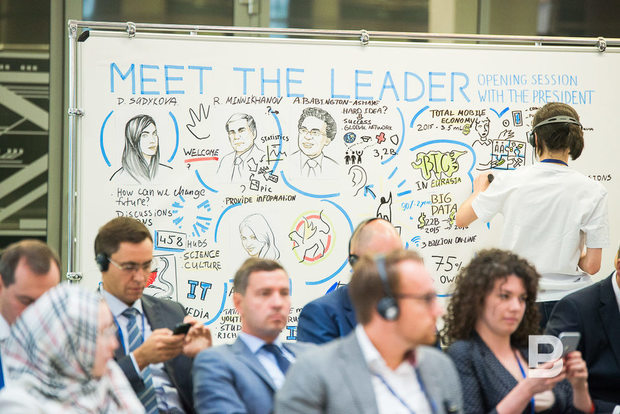
'I would like to welcome good and efficient work. I hope Kazan will be a place you would like to visit many times. This is why Rustam Minnikhanov welcomed the young shapers in Russian, Tatar and English and got loud applauses. The director of the Eurasian region of the World Economic Forum Anastasia Kalinina followed President's example and also addressed the participants in Russian. 'The World Economic Forum and the Republic of Tatarstan are lasting friends. We have already been here and hope it won't be our last visit,' Kalinina expressed her hope. According to her, sustainable development was the main topic of the meeting. The republic was chosen as a site for a reason. It represents sustainable development and a place where the young really flourishes.
'More than 94% of the population have access to 3G. E-sector is highly developed. It affects the development of e-services, education, e-health. You are the champion among the regions, of course. From the economic policy perspective, you are getting rid of oil feedstock dependence. There is a reduction of the GNP from 60 to 30% of crude oil turnover. All these aspects make you a wonderful place for discussion,' Kalinina is convinced.
The head of the Global Shapers Community of the World Economic Forum Adeyemi Babington-Ashaye was another honourable guest. He told that he thinks irrational at first sight but advanced ideas need good support. Trying to involve listeners in the dialogue, he offered those people who did not understand their decisions to raise their hands. However, having seen just a few hands in the hall, he bewilderingly joked: 'Did you get married?'
Adeyemi Babington-Ashaye told young leaders have great support in Tatarstan, which is, of course, a very important factor.
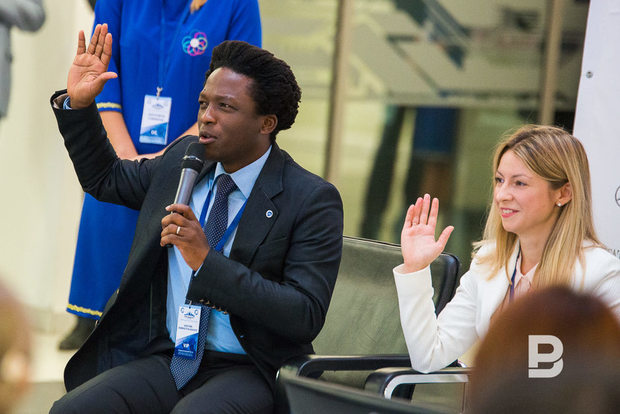
Technologies in hospitals, schools and management
The format of the meeting presupposed several presentations. The first one was called Innovations in Big Data. The director of IT Park Anton Grachev told about it himself. He told about a huge volume of information kept in gadgets, and how it could benefit business. In his opinion, 90% of all data on the planet was created during two years. And we can only presuppose what will happen next.
Then one of the shapers addressed Rustam Minnikhanov and asked a question, which was topical for residents of the republic: in your opinion, can the government of Tatarstan use big data in order to provide a better quality of health or state services?
In answer to it, President replied that modern information technologies allow to change the work of state and municipal services. He put an example of centralised dispatcher systems in health that keep information about every patient. Implementation of e-diaries at schools is another example.
'Neither parent knew that he brought his diary and removed a page. As a rule, if there were bad notes, the diary was lost or pages were removed. Today there is an online diary where parents can see their kid's results. Moreover, parents can see what their kid ate at lunch by e-card.'
President also told about the implementation of IT in major overhaul of the Housing Fund.
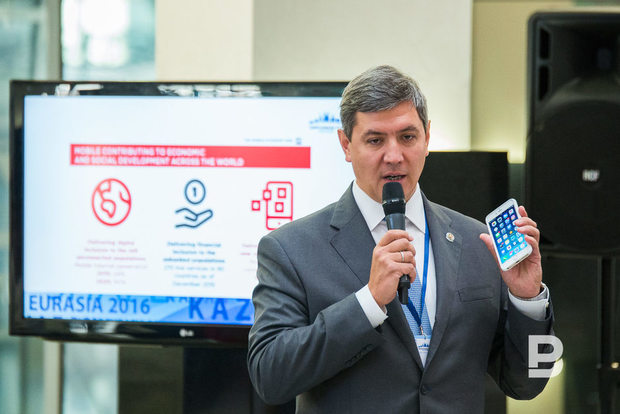
The second topic of the presentation was Total Mobile Revolution. It was about the penetration speed of mobile technologies and how mobile systems could support the social and economic development throughout the world. Rustam Minnikhanov was asked the next question: 'How are your mobile systems integrated in state services in Tatarstan? What are the best examples you can tell us about?'
Having noted, he was not the best specialist but a user, President gave the floor to the Minister of Information and Communication of Tatarstan Roman Shaikhutdinov who told about a portal, which well-known in the republic, — e-Government and such systems as People's Control, People's Inspector, etc.
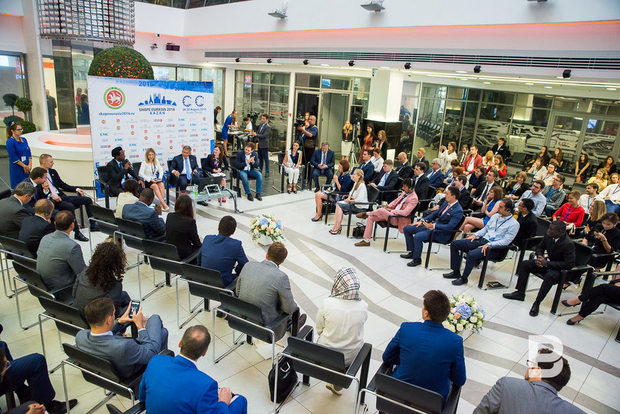
'Actually, we need to change many things'
The third presentation was called Future Profession. The participants discussed the preparation of specialists and transformation of market's needs while IT is developing.
'What can we do to in order to prepare a person after the graduation for the needs existing at that moment?' a shaper from Cairo asked President of Tatarstan a question.
'Actually, the question is topical and uneasy. In general, the system of personnel preparation and its demand in our country was a bit unclear. During the Soviet Union, there was a certain staff preparation system: colleges, vocational colleges, highs schools. Once in the 90s, all people wanted to get a higher education. A great number of institutes appeared. It turned out the number of school graduates was not enough in order to cover these establishments. Actually, wishing the best for their children, parents educated them and spent the last money and did not know it was not a higher education establishment but its parody,' Minnikhanov told.
He told they had to work on this topic as well as the federal centre. In President's opinion, it is important to leave enough professional institutions that comply with standards without forgetting the importance of preparation of vocational qualifications. By the way, Tatarstan won the bid for the organisation of WorldSkills in 2019. He noted at the moment we are not able to compete in such competitions. 'Actually, we need to change many things,' Minnikhanov believes.
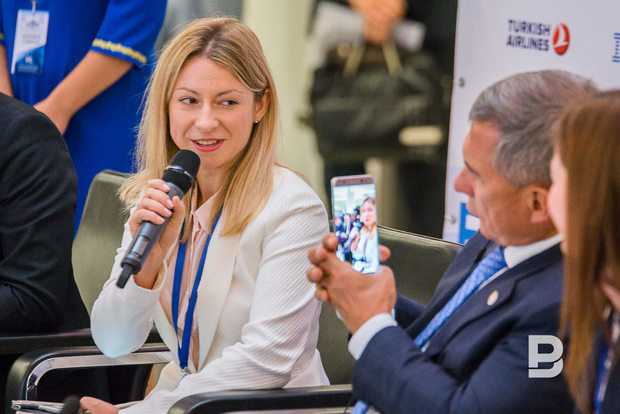
Resource centres for the preparation of skilled staff continue to be created in the republic now.
Then there were asked different questions. One of the participants took the advantage and invited President to Expo-2017 to Kazakhstan. And a guy from Naberezhnye Chelny who moved to Silicon Valley to work in Google told about a novelty of the company. It is an analogous AI in a phone that not only helps at work but also is ready to play games with its user. 'I see you are an active phone user. I hope it is Android. In your opinion, will such an idea be popular in Tatarstan? Will you use it?' the Tatarstan guy asked the leader of the meeting.
'We will certainly use it. But we don't have time for games,' Minnikhanov commented.
Having told that in 2016 the EU allowed to export over 6,000 different agricultural products to Europe, a shaper from Kyrgyzstan asked about the state of affairs of Tatarstan in export.
President told the export potential of the industrial production of the republic is higher – at the moment over 50% of industrial production is exported from Tatarstan. It is oil, petrochemical refinery goods, engineering products, products of the defence industry and a small part of agricultural goods. In the latter case, Tatarstan and Russia are the main markets.
Rustam Minnikhanov also told it was necessary to activate their work with Kyrgyzstan. He is going to visit this country on 3 September in order to discuss their potential cooperation.